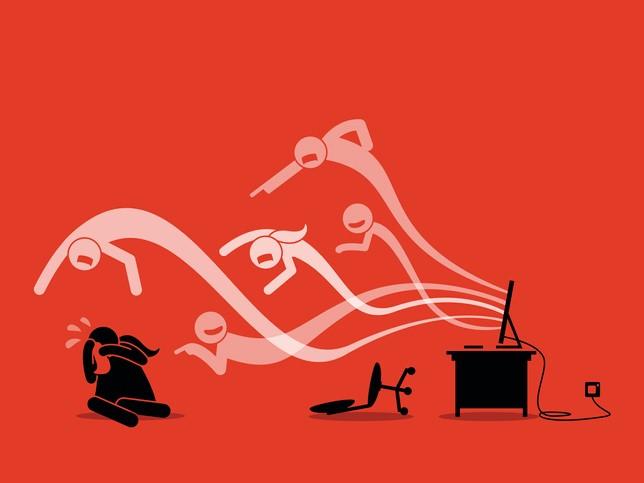
Do EDI kitemarks help protect female researchers from online abuse?

You may also like
At the time of writing there is much media debate around online abuse, particularly that directed at women. This has come alongside plenty of hand-wringing about the need for social media companies to “do more” to prevent such abuse, with threats of far-reaching legislation if they fail to do so.
While most of the media coverage focuses on the abuse received by women in the public eye, given our work around online abuse in HE we question whether the sector is in good shape to support those who might become victims.
At a macro level the sector makes broad claims about its inclusivity and there are many “kitemarks” for institutions to show their commitments to equality, diversity and inclusion, such as the Athena SWAN Award, the Race Equality Charter and the Stonewall Workplace Equality Index. Yet research suggests that the sector still has a long way to go, and we would question whether these kitemarks do much to support victims of abuse in those institutions so proudly displaying them.
While they might allow an institution to claim commitment to, for example, gender equality, is there anything within the assessment process that challenges institutions on how they respond to abuse or how they implement policies and systems so that victims of abuse can disclose it and receive support?
Recent reports by both Wellcome and ARMA cast significant doubt on the efficacy of these awards in the research environment and its support for women who might be subject to abuse. The ARMA research surveyed almost 300 research managers across the sector, with most respondents being female. It found that 31 per cent had both witnessed and experienced bullying, harassment or discrimination.
Wellcome’s report is a more damning reflection of the experiences of researchers in HE. In a survey of approximately 4,200 researchers, 43 per cent had experienced bullying or harassment and women were far more likely (49 per cent) to have experienced bullying and harassment than men. Sadly, only 37 per cent stated that they would be comfortable speaking out about bullying or discrimination without fear of negative consequences.
These reports do not specifically focus on bullying, harassment and discrimination taking place online, but we would raise concerns that, as a result of lockdowns and post-Covid reactions, protection from online abuse is more important than ever.
We know from our own discussions with researchers that digital technology is frequently used in the supervisor-researcher relationship and, as a result, is a means of abuse outside of the laboratory or meeting room. All too frequently we have been told of late-night emails or, arguably worse, texts or private messages (via WhatsApp or similar). Once this form of communication is established as acceptable, the volume increases and research staff and students can be inundated with messages and demands on their personal device at any time of day or night.
We further see encouragement by supervisors and university marketing teams for researchers to “raise their profile” on social media platforms, with little practical guidance on how to do this safely. This potentially places them in a toxic environment, exposed to abuse from anonymous trolls or being attacked about their work by others within the academic community.
We are sure, given our previous research in the sector, that few institutions have policies to support those who become subject to such online abuse. Worse, in cases we have heard, when abuse does occur, institutions often distance themselves from the researcher and claim it as solely the responsibility of the individual.
We have commented before about the failing of the regulator to get to grips with online abuse, and its statement of expectations for institutions in this area pays mere lip service to online abuse: “Our definitions include harassment and sexual misconduct through any medium, including, for example, online.”
The statement of expectations makes no mention whatsoever of research students and their often very different experiences of an institution compared with those on a taught programme. For the researcher, their primary contact will be with supervisors and, if they are fortunate, a wider research team. If they are in receipt of harassment or abuse from a member of this environment, would an institution be confident the student will be fully supported should they disclose this? Sometimes the institution can feel extremely remote from researchers who are the victims of abuse.
EDI kitemarks undoubtedly have the best of intentions, but does the award actually mean those who might be more likely to receive abuse will be effectively supported? It is unquestionable that women receive more abuse online, and academia is no oasis for this. The above surveys, and our own work, would suggest that we still have a long way to go.
There are, however, some concrete steps institutions can take to better support victims of abuse:
- Graduate schools and doctoral college staff should be trained to understand the nature of online abuse specifically − and how to support victims.
- If institutions do encourage researchers to “raise their profiles” on social media, they should provide training around online risk and harm, plus how to use the tools provided by those platforms to report and block abuse. Guidance should be given on the use of personal social media accounts to promote university business, and institutions should have clear policies on how this risk is managed and what support is provided.
- Institutions should have clearly communicated policies on how supervisors can conduct online communication with researchers and what are acceptable hours for communication.
- Institutions should consider whether the use of personal devices and platforms are appropriate ways for a supervisor and researcher to communicate about their research projects.
- Institutions should make student welfare and acceptable online communication part of supervisor training.
- Graduate schools and doctoral colleges should provide, and make very apparent, routes for disclosure for those whose phones are pinging at midnight. These should be more comprehensive than an online anonymous reporting system.
Andy Phippen is professor of digital rights at Bournemouth University.
Emma Bond is pro vice-chancellor for research and professor of sociotechnical research at the University of Suffolk.


